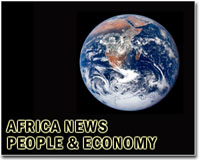| . |  |
. |
Rome (UPI) Nov 12, 2009 Fifty heads of state will meet in Rome Sunday to examine the way that rich Middle Eastern and Asian states are buying up vast tracts of farmland in Africa, often secretly, in what is seen as a massive land grab that will worsen conditions in the world's hungriest continent. All told, some 50 million acres of arable land across Africa have been gobbled up by foreign governments or investors in the last two years, usually to the detriment of African smallholders who are being squeezed out. Other land is being acquired in South America and Southeast Asia. "In the worst cases it's fair to say we're looking at neo-colonialism," said David Hallam, deputy director of the trade and markets division of the U.N. Food and Agriculture Organization, which holds its summit this year in Rome. These land acquisitions comprise about 10 percent of the land being farmed in Africa. Over the last two years Saudi Arabia, the United Arab Emirates, Kuwait, Egypt, China, India, South Korea and others have purchases large tracts of African land. Some of these states, such as those in the Gulf, have little arable land of their own to feed growing populations and have to import huge quantities of food. The aim is to secure supplies of food for their people at a time when food prices are rising and the world faces food shortages in the not-too-distant future. Many of these deals, involving billions of dollars, have been pushed through in great secrecy with corruption-riddled African governments that have little accountability or transparency. Saudi Arabia, one of the most aggressive purchasers, is in the process of setting up a chain of 240,000-acre farms abroad and plans to ship the food directly to the kingdom. The U.A.E. has bought 70,000 acres of land in Sudan. China took more than 6 million acres of the Congo to develop the world's largest palm-oil plantation. South Korea's Daewoo Logistics Corp. leased 3.2 million acres on the Indian Ocean island of Madagascar, off Africa's eastern coast, (half the island's arable land) for 99 years to grow corn and palm oil. The deal played a role in the ousting of President Marc Ravalomanana in March 2009 after it became known that Daewoo would barter the land for infrastructure projects. The FAO has said that by 2050, when the world's population will probably total more than 9 billion, 3 billion more than now, global food production will have to increase by 70 percent. In Africa, which contains many of the world's poorest states, the population is expected to double to 1 billion in that period. Feeding all those people will require investment of $83 billion annually over the next 40 years to boost the amount of cultivated land and food production, the FAO says. A recent U.N. report titled "Land Grab or Development Opportunity? Agricultural investments and Land deals in Africa" called for curbing the mushrooming land acquisitions. This has led to proposals by the United Nations and the World Bank for the formulation of a code of conduct that will give Africa's poor, who are widely seen as being dispossessed by the land grab, a voice in the massive deals being made and not just their governments. The report, compiled by a number of international organizations including the FAO, found that many African states do not have legal mechanisms to protect the rights of local people. However, Alex Wijeratna of the U.K.-based development agency Action Aid believes that a code of conduct will not be sufficient to ensure that the rights of Africa's small farmers are not being trampled by Gulf monarchs and big corporations, or to break the secrecy shrouding many of these deals. They constitute about 70 percent of the region's population and account for 60 percent of its agricultural production. "There's a new scramble for land in Africa and it's growing at an incredible rate," Wijeratna told AllAfrica.com. There's massive secrecy and poor communities can't get information and they're not being consulted. "There's an argument for a moratorium on sales until there's a proper framework to assess them. We're concerned that an agreement will not come fast enough."
Share This Article With Planet Earth
Related Links Africa News - Resources, Health, Food
 Mozambique's Guebuza re-elected in landslide: final results
Mozambique's Guebuza re-elected in landslide: final resultsMaputo (AFP) Nov 11, 2009 Mozambique's President Armando Guebuza won a landslide re-election with 75 percent of the vote, election officials said Wednesday. "The National Elections Commission announces that citizen Armando Emilio Guebuza has been re-elected president of the republic of Mozambique for a period of five years," the commission's chief Joao Leopoldo da Costa told reporters, after the vote on October 28. ... read more |
|
| The content herein, unless otherwise known to be public domain, are Copyright 1995-2009 - SpaceDaily. AFP and UPI Wire Stories are copyright Agence France-Presse and United Press International. ESA Portal Reports are copyright European Space Agency. All NASA sourced material is public domain. Additional copyrights may apply in whole or part to other bona fide parties. Advertising does not imply endorsement,agreement or approval of any opinions, statements or information provided by SpaceDaily on any Web page published or hosted by SpaceDaily. Privacy Statement |